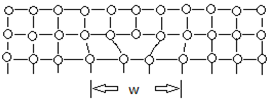This set of Mechanical Behaviour Interview Questions and Answers for freshers focuses on “Peierls-Nabarro Stress and Dislocation Width”.
1. Which factor doesn’t affect P-N stress?
a) Periodicity of atoms
b) Dislocation width
c) Crystal structure
d) Applied stress
View Answer
Explanation: P-N stress is mainly dependent on the Periodicity of atoms and dislocation width. The Periodicity of atoms changes with the crystal structure. P-N stress doesn’t depend on applied stress.
2. What is expression for width of dislocation?
a) w = a
b) w = a/(1-v)
c) w = a(1-v)
d) w = a/(v-1)
View Answer
Explanation: Width of dislocation (w) is related to spacing between slip planes (a). It is given as w = a/(1-v). Here v is Poisson’s ratio.
3. A dislocation of width 0, requires stress equal _____ to move.
a) Negligible
b) Infinity
c) Shear modulus
d) Very less
View Answer
Explanation: P-N stress is a sensitive function of width of dislocation. It is very high for dislocations with less width. P-N stress is equal to G for dislocation of width 0.
4. What is P-N stress for a dislocation of width 5b?
a) 0
b) G
c) G/400
d) G/1014
View Answer
Explanation: With increase in width of dislocation P-N stress decreases. For width of 5b dislocations P-N stress is very low. Its value is G/1014.
5. What is P-N stress for a dislocation of width 10b?
a) 0
b) G
c) G/400
d) G/1027
View Answer
Explanation: As the width of dislocation increases, there is rapid decrease in P-N stress. This becomes negligible for width 10b. Its value is G/1027.
6. Identify the type of dislocation?

a) Wide
b) Narrow
c) Screw
d) Frank partial
View Answer
Explanation: The dislocation shown in the figure has quite narrow elastic strain field. That’s why it is narrow dislocation. Wide dislocations have wide range of elastic strain field.
7. Which materials have wide dislocations?
a) BCC metals
b) FCC metals
c) Ionic solids
d) Covalent solids
View Answer
Explanation: FCC metals have wide dislocations. It makes the P-N stress of these metals very low. That’s why these deform easily.
8. Covalent solids have ____ width dislocations.
a) Wide
b) Narrow
c) Moderate
d) Very narrow
View Answer
Explanation: Covalent solids have very narrow dislocations. This fact makes them very hard to deform. FCC metals and BCC metals have wide and narrow dislocations respectively.
9. BCC metals (transition metals) have _____ yield strength temperature sensitivity.
a) No
b) Small
c) Large
d) Moderate
View Answer
Explanation: BCC metals show activation of slip planes on the higher temperature. So these show large yield strength temperature sensitivity. Their yield strength decreases on low temperatures.
10. Ionic solids have _____ dislocation width and _____ frictional stress.
a) Wide, very small
b) Wide, moderate
c) Narrow, moderate
d) Narrow, large
View Answer
Explanation: Ionic solids have narrow dislocations. Frictional stress is a function of dislocation width. That’s why these have moderate frictional stress.
11. A width of dislocation is dependent on temperature.
a) True
b) False
View Answer
Explanation: Width of dislocation is temperature sensitive. It decreases with a decrease in temperature. This phenomenon leads to an increase in frictional stress at low temperatures.
12. Smaller relative atomic displacements are required for a motion of a narrow dislocation.
a) True
b) False
View Answer
Explanation: Larger relative atomic displacements are required for a motion of a narrow dislocation. While smaller displacements are required in case of wide dislocations movement. That’s why P-N stress decreases as dislocation width increases.
Sanfoundry Global Education & Learning Series – Mechanical Behaviour & Testing of Materials.
To practice all areas of Mechanical Behaviour for Interviews, here is complete set of 1000+ Multiple Choice Questions and Answers.
If you find a mistake in question / option / answer, kindly take a screenshot and email to [email protected]
